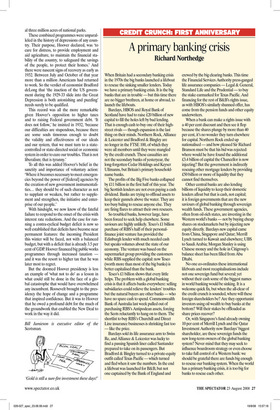A primary banking crisis
Richard Northedge
When Britain had a secondary banking crisis in the 1970s the big banks launched a lifeboat to rescue the sinking smaller lenders. Today we have a primary banking crisis. It is the big banks that are in trouble — but this time there are no bigger brethren, at home or abroad, to launch the lifeboats.
Barclays, HBOS and Royal Bank of Scotland have had to raise £20 billion of new capital to fill the holes left by bad lending. That is enough cash to buy one of their highstreet rivals — though expansion is the last thing on their minds. Northern Rock, Alliance & Leicester and Bradford & Bingley are no longer in the FTSE 100, of which they were all members until they were mangled by the credit crunch. These casualties are not the secondary banks of yesteryear, the long-forgotten Cedar Holdings and Keyser Ullmanns, but Britain’s primary householdname banks.
The profits of the Big Five banks collapsed by £11 billion in the first half of this year. The big Scottish lenders are not even paying a cash dividend. Banks are trying to offload assets to keep their gunnels above the water. They are too busy baling to rescue anyone else. They are firing flares to attract their own rescuers.
So troubled banks, however large, have been forced to seek help elsewhere. Some saviours are highly unlikely. Tesco’s £1 billion purchase of RBS’s half of their personalfinance joint venture has provided the Edinburgh lender with much needed cash but speaks volumes about the state of our economy. The venture was based on the supermarket group providing the customers while RBS supplied the capital: now Tesco (worth more than most of the big banks) is better capitalised than the bank.
Tesco’s £1 billion shows that every little helps. The problem with a global banking crisis is that it affects banks everywhere: selling subsidiaries could relieve the lenders’ troubles but the natural buyers are other banks — who have no spare cash to spend. Commonwealth Bank of Australia last week pulled out of purchasing RBS’s Antipodean assets, forcing the Scots reluctantly to hang on to them. The shortlist to buy RBS’s Churchill and Direct Line insurance businesses is shrinking fast too — like the price.
Barclays sold its life assurance arm to Swiss Re, and Alliance & Leicester was lucky to find a passing Spanish liner called Santander prepared to take on its passengers. But Bradford & Bingley turned to a private-equity outfit called Texas Pacific — which turned and fled when it saw the numbers. In the end a lifeboat was launched for B&B, but not one captained by the Bank of England and crewed by the big clearing banks. This time the Financial Services Authority press-ganged life assurance companies — Legal & General, Standard Life and the Prudential — to buy the stake earmarked for Texas Pacific. And financing for the rest of B&B’s rights issue, as with HBOS’s similarly shunned offer, has come from the pension funds and other equity underwriters.
When a bank can make a rights issue with a 40 per cent discount and then see it flop because the shares plunge by more than 40 per cent, it’s no wonder they turn elsewhere for capital. Northern Rock ended up nationalised — and how pleased Sir Richard Branson must be that his bid was rejected: where would he have found the additional £3.4 billion of capital the Chancellor is now injecting? But the government is indirectly rescuing other mortgage lenders by providing £50 billion or more of liquidity that they cannot find themselves.
Other central banks are also lending billions of liquidity to keep their domestic lenders afloat but that is cash, not capital; it is foreign governments that are the new saviours of global banking through sovereign wealth funds. These government agencies, often from oil-rich states, are investing in the Western world’s banks — not by buying cheap shares on stockmarkets but by injecting new equity directly. Barclays new capital came from China, Singapore and Qatar; Merrill Lynch turned to Kuwait and elsewhere; UBS to Saudi Arabia; Morgan Stanley is using Chinese money and the hole in Citigroup’s balance sheet has been filled from Abu Dhabi.
No one co-ordinates these international lifeboats and most recapitalisations include not one sovereign fund but several; yet without their cash some of the biggest names in world banking would be sinking. It is a welcome quick fix, but when the all-clear of the credit crunch is sounded, where will these foreign shareholders be? Are they opportunist investors using oil wealth to buy banks at the bottom? Will their stakes be offloaded as share prices recover?
Or, with Singapore’s fund already owning 10 per cent of Merrill Lynch and the Qatar Investment Authority now Barclays’ biggest shareholder, are these sovereign funds the new long-term owners of the global banking system? Never mind that they may seek to influence boardroom strategy or even choose to take full control of a Western bank: we should be grateful there are funds big enough to rescue our banking system. When the world has a primary banking crisis, it is too big for banks to rescue each other.


























































 Previous page
Previous page